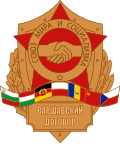People's Republic of Albania (1946–1976) Republika Popullore e Shqipërisë People's Socialist Republic of Albania (1976–1991) Republika Popullore Socialiste e Shqipërisë Republic of Albania (1991–1992) Republika e Shqipërisë | |||||||||
|---|---|---|---|---|---|---|---|---|---|
| 1946–1992 | |||||||||
| Motto: Ti Shqipëri, më jep nder, më jep emrin Shqipëtar "Albania, you give me honor, you give me the name Albanian" Proletarë të të gjitha vendeve, bashkohuni! "Proletarians of all countries, unite!" | |||||||||
| Anthem: Himni i Flamurit "Hymn to the Flag" | |||||||||
 The People's Socialist Republic of Albania in 1989 | |||||||||
| Status | Member of the Warsaw Pact (until 1968) and Comecon (until 1987) | ||||||||
| Capital and largest city | Tirana | ||||||||
| Official languages | Albanian | ||||||||
| Religion | State atheism (official) | ||||||||
| Demonym(s) | Albanian | ||||||||
| Government | Unitary Socialist republic under a totalitarian hoxhaist dictatorship[1](1946-1985) | ||||||||
| First Secretary | |||||||||
• 1946–1985 | Enver Hoxha | ||||||||
• 1985–1992 | Ramiz Alia | ||||||||
| Chairman of the Presidium of the People's Assembly | |||||||||
• 1946–1953 | Omer Nishani | ||||||||
• 1953–1982 | Haxhi Lleshi | ||||||||
• 1982–1991 | Ramiz Alia | ||||||||
| Prime Minister | |||||||||
• 1946–1954 | Enver Hoxha | ||||||||
• 1954–1981 | Mehmet Shehu | ||||||||
• 1981–1991 | Adil Çarçani | ||||||||
| Legislature | People's Assembly | ||||||||
| Historical era | Cold War | ||||||||
| 20 October 1944 | |||||||||
• People's Republic formed | 10 January 1946 | ||||||||
| 1956–1961 | |||||||||
| 28 December 1976 | |||||||||
| 1972–1978 | |||||||||
| 11 December 1990 | |||||||||
| 31 March 1991 | |||||||||
| 22 March 1992 | |||||||||
| HDI (1990 formula) | 0.790[2] high | ||||||||
| Currency | Franga (1946–1947) Albanian lek (1947–1991) | ||||||||
| Calling code | +355 | ||||||||
| |||||||||
| Today part of | Albania | ||||||||
| Eastern Bloc |
|---|
 |
The People's Socialist Republic of Albania (Albanian: Republika Popullore Socialiste e Shqipërisë), officially as the People's Republic of Albania from 1946 until 1976, and as the Republic of Albania from 1991 to 1992, was the communist state in Albania from 1946 to 1991. It succeeded the Democratic Government of Albania (1944–1946).
During this time period, the country was ruled mainly by Enver Hoxha and the Party of Labour of Albania. They ruled Albania by establishing a Stalinist, and later Hoxhaist, style of state administration and adhering to policies which stressed national unity and self-reliance.[3] Described by scholars as a totalitarian state,[4] travel and visa restrictions made Albania one of the most difficult countries to visit or travel from. Being Europe's only Muslim-majority country (aside from Turkey) at the time, it declared itself the world's first atheist state in 1967, but after the fall of communism in Albania in 1991, the practice of religion slowly increased.[5] It was the only Warsaw Pact member to formally withdraw from the alliance before 1990, an action which was occasioned by the Warsaw Pact invasion of Czechoslovakia in August 1968. The government implemented reforms which were aimed at modernizing Albania, and they resulted in significant gains in the areas of industry, agriculture, education, the arts, and culture, which contributed to a general increase in the Albanian population's standard of living. However, these developments coincided with political repression by the secret police, the Sigurimi, for the purposes of preventing a counter-revolution, which included dismissal from employment, imprisonment in forced labor camps and executions.[6]
The first multi-party elections in Socialist Albania took place on 31 March 1991 – the Communists gained a majority in an interim government. The Republic of Albania was proclaimed on 29 April 1991 and the country's first parliamentary elections were held on 22 March 1992.[citation needed] The People's Socialist Republic of Albania was officially dissolved on 28 November 1998 upon the adoption of the new Constitution of Albania.
- ^ Sokol Paja (February 2014). "Features of the Albanian Totalitarian State: Relations Between Religion and the State" (PDF). European Scientific Journal.[predatory publisher]
- ^ Human Development Report 1990, p. 111
- ^ Kushtetuta e Republikës Popullore Socialiste të Shqipërisë: miratuar nga Kuvendi Popullor më 28. 12. 1976 [1]
- ^ Pajo, Matilda (September–December 2016). "Consequences of the Totalitarian Past on Albanian post-communist society" (PDF). Revistia. 3 (1): 138–141 – via European Journal of Multidisciplinary Studies.
- ^ Majeska, George P. (1976). "Religion and Atheism in the U.S.S.R. and Eastern Europe, Review". The Slavic and East European Journal. 20(2). pp. 204–206.
- ^ "Socialist Albania: The Stalinist state". Encyclopædia Britannica.

